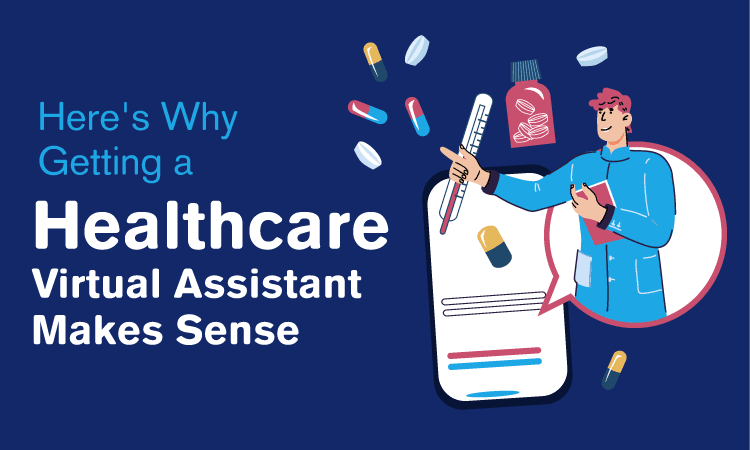In many ways, healthcare has completely changed because of the threat of Covid-19. While things are slowly getting back to normal, experts agree that the pandemic is far from eradicated. Now is certainly a good time to consider how Covid-19 changed healthcare, the massive shift to telemedicine across facilities, and how investing in a healthcare virtual assistant could help medical practices thrive even in uncertainty.
Embracing Telemedicine
In the past two years, healthcare facilities and providers around the globe had to modify their operations to better accommodate patients. The pandemic has forced medical professionals to rapidly adapt the way they provide care.
In-person appointments became too risky at the height of the pandemic. So, many providers turned to telemedicine as a way to see patients without putting them in danger. This shift happened almost overnight, and it’s been a huge success.
It’s still popular with patients; a recent study found that more than 80% of patients who had a telemedicine visit were satisfied with the care they received. Patients appreciate the convenience and safety of being able to see their doctor from home.
For providers, there are plenty of advantages to telemedicine as well. Perhaps the most obvious is that it cuts down on no-shows. When patients have to come into the office for an appointment, there’s always a risk they’ll miss it due to traffic, weather, or other unforeseen circumstances. But with telemedicine, they can log in from wherever they are and get the care they need.
Telemedicine can also save providers time and money. With in-person appointments, there’s always the potential for things to run late. But with telemedicine, appointments can start and end on time, without any disruptions. It means healthcare professionals can schedule more meetings in a day.
Finally, telemedicine is a great way to improve patient engagement. When patients feel like they have a good relationship with their provider, they’re more likely to follow through with treatment plans and take their medications as prescribed. And research shows that patients who use telemedicine are more likely to be engaged in their healthcare.
Telemedicine and the Healthcare Virtual Assistant
The healthcare industry has been using virtual assistants (VAs) for years now. VAs are an invaluable resource for tasks like appointment scheduling, customer service, and billing. And with the shift to telemedicine, they became more important than ever.
During the pandemic, healthcare practices went completely online. Medical facilities leveraged one-on-one video health consultations, revenue cycle management software, electronic healthcare records, and other digital solutions.
What is a Healthcare Virtual Assistant?
A healthcare virtual assistant is a medical professional who provides administrative and clinical support to healthcare providers remotely. Healthcare VAs are skilled in a variety of tasks, from scheduling appointments to handling medical billing.
Healthcare VAs play a critical role in the shift to telemedicine. They help practices manage their new digital operations and keep everything running smoothly. And because they work remotely, they can provide support to multiple practices at once.
Even in the new normal, healthcare practices can still benefit from hiring virtual assistants. The benefits of hiring a VA outweigh the costs, especially since VAs can easily handle many of the routine, time-consuming tasks of an in-office assistant. With the average rate of a medical administrative assistant at $18/hour, and a healthcare VA at approximately $6/hour, the choice to hire a virtual assistant becomes much easier.
Investing in a healthcare virtual assistant? Keep these in mind
If you’re thinking about investing in a healthcare VA, there are a few things you should keep in mind. First, make sure you choose someone with experience in the healthcare industry. They should be familiar with the terminology and have a good understanding of the workflow in medical practice.
Second, you’ll want to find a VA who is comfortable using technology. They should be able to use video conferencing software, electronic health records, and other digital tools. Finally, make sure you choose someone reliable and detail-oriented. They should be able to keep up with the fast-paced nature of the healthcare industry and handle sensitive information with care.
Investing in a healthcare VA is a smart way to improve the efficiency of your practice while keeping your overhead low. With their help, you can focus on providing quality care to your patients without getting bogged down in administrative tasks.
Tasks a Healthcare Virtual Assistant Handles
Healthcare VAs can take on a variety of tasks, from clinical support to appointment scheduling. There are different types of healthcare VAs, so if you're getting one for your team, it's best to take stock of what tedious or time-consuming tasks you'd like them to take over.
For instance, a medical administrative assistant performs a different function from a virtual medical scribe, a virtual front desk officer, or a virtual transcriptionist, though there may be admin assistants who are capable of doing tasks for these other roles. What's more, specialized medical VAs exist, like dental VAs and veterinary VAs.

Medical Administrative Assistant Tasks
- Scheduling appointments: A healthcare virtual assistant can help you schedule appointments with patients, both in-person and online. They can also manage your appointment reminders and follow-ups, ensuring your patients get to their scheduled sessions.
- Arranging referrals: When you have a healthcare VA, you can request them to coordinate referrals with other practices or facilities.
- Billing and coding: Healthcare VAs can help with billing and coding, two of the most important (and time-consuming) tasks in any medical practice. They can make sure your claims are accurate and submit them promptly.
- Electronic record keeping: Your healthcare VA can help you keep accurate patient records by updating them and ensuring they have the right information. They can work with your medical scribe on data entry and verification.
Medical Receptionist Tasks
- Answering phone calls: A medical receptionist is often the first point of contact for patients calling your practice. They will answer phone calls, take messages, and schedule appointments.
- Filing insurance claims: Many medical practices file insurance claims on behalf of their patients. As a result, medical receptionists need to be familiar with different insurance plans and have a strong understanding of billing procedures.
- Collecting payments: Medical receptionists may also collect copayments and deductibles from patients. They may also process patient refunds and account for any overpayments.
- New patient registration: A medical receptionist may create records for new patients, and coordinate with their former healthcare provider for the patient's medical records.
The Benefits of Working with a Healthcare Virtual Assistant
There are many benefits of working with a healthcare VA. Here are just a few:
- Reduced costs: Working with a VA can save you money on overhead costs, like office space and equipment. Hiring a healthcare virtual assistant also means saving on employee expenses beyond salaries, like insurance, non-productive bonuses, and retirement fund contributions.
- Improved efficiency: Healthcare VAs can help you streamline your operations and improve your practice’s overall efficiency. Having a healthcare virtual assistant means no longer worrying about back-office tasks like EMR documentation.
- Flexibility: Healthcare VAs can work around your schedule and offer support when you need it most. You also don't need to worry about contracts, setup fees, or training your healthcare virtual assistant.
- Improved patient care: By freeing up your time, healthcare VAs can help you focus on providing quality care to your patients. With a VA, you can let go of the many admin tasks healthcare professionals must fulfill. You can focus on diagnosing, treating, and counseling the patient, the things that led you to a career in this field in the first place!
Hire a Healthcare Virtual Assistant Today
If you're looking for ways to improve your healthcare practice without breaking the bank, a virtual assistant may be just what you need. Healthcare VAs can help you streamline your operations and free up time so that you can focus on providing quality care to your patients.
Wing has a wide selection of skilled assistants who are ready to help you take your practice to the next level. Contact our sales team today to learn more about how we can help you get the most out of your practice.
Aya is Wing Assistant’s blog manager. When she’s not wrangling content briefs, editing article drafts and handling on-page SEO, she is crafting messages for Wing’s other communication materials. Aya writes about SaaS startups, marketing for startups, search engine optimization, and pop culture.







